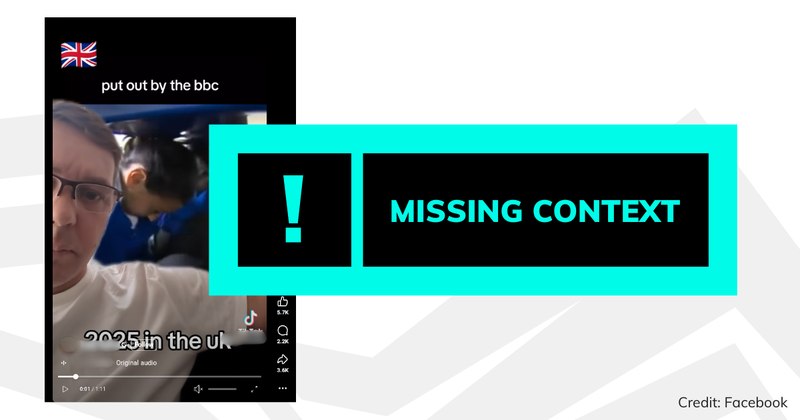What was claimed
A video of a lockdown drill in a UK school is being shared with an implication it shows “what they're making children do in schools in 2025”.
Our verdict
This footage was filmed in 2017.
What was claimed
A video of a lockdown drill in a UK school is being shared with an implication it shows “what they're making children do in schools in 2025”.
Our verdict
This footage was filmed in 2017.
A video of a lockdown drill in a UK school is being shared on social media with overlaid text saying “2025 in the UK”, implying that the footage was taken this year.
But it is actually from an old BBC news report that aired in 2017.

The video, viewed more than 46,000 times on TikTok, shows children getting under tables while a voice alarm says “this school is in lockdown”. It then cuts to an interview with a teacher who says the children are “quite calm” and “understand the importance” of the drills.
The man visible throughout, who is reacting to these clips, then says it “pretty much sums up 2025 in the UK under a Labour government”.
Join 72,953 people who trust us to check the facts
Sign up to get weekly updates on politics, immigration, health and more.
Subscribe to weekly email newsletters from Full Fact for updates on politics, immigration, health and more. Our fact checks are free to read but not to produce, so you will also get occasional emails about fundraising and other ways you can help. You can unsubscribe at any time. For more information about how we use your data see our Privacy Policy.
He claims “this is what they’re making children do in schools in 2025”.
The footage in the video dates back to 2017, when the UK was governed by the Conservative party under Theresa May.
The government does provide advice for educational settings on how to be better prepared against terrorism and other major incidents, including guidance on lockdowns, when children or staff are locked within buildings for their safety. There have been several media reports recently about lockdown drills in the UK.
The Terrorism (Protection of Premises) Bill, 2025, also known as Martyn’s Law, in honour of Martyn Hett, who was killed in the Manchester Arena attack, received Royal Assent on 3 April 2025. It will require those responsible for certain buildings, including schools, to take steps to reduce their vulnerability to acts of terrorism.
Before sharing videos and images that you see on social media claiming to depict current events, consider whether it comes from a verifiable and trustworthy source. Our guides to spotting misleading images and videos can help you do this.
This article is part of our work fact checking potentially false pictures, videos and stories on Facebook. You can read more about this—and find out how to report Facebook content—here. For the purposes of that scheme, we’ve rated this claim as missing context because this clip is old, and dates back to 2017.
Full Fact fights for good, reliable information in the media, online, and in politics.
Bad information ruins lives. It promotes hate, damages people’s health, and hurts democracy. You deserve better.
Subscribe to weekly email newsletters from Full Fact for updates on politics, immigration, health and more. Our fact checks are free to read but not to produce, so you will also get occasional emails about fundraising and other ways you can help. You can unsubscribe at any time. For more information about how we use your data see our Privacy Policy.